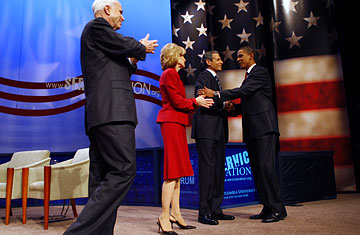
Republican presidential candidate John McCain, left, applauds as Democratic presidential candidate Barack Obama, right, greets TIME magazine managing editor Richard Stengel and Judy Woodruff of PBS at Columbia University on Sept. 11
After three virulent days of pigs and lipstick, the presidential campaign shifted from overdrive to a measured idle on the anniversary of 9/11, as John McCain and Barack Obama answered questions separately about what they would do to bolster volunteerism and service among Americans. The candidates met briefly on a stage at Columbia University for a quick hug and a handshake in between interviews with TIME managing editor Richard Stengel and PBS correspondent Judy Woodruff at the ServiceNation Presidential Forum.
The campaign changed gears for a moment from attack politics to finding common ground, with Obama and McCain agreeing that ROTC recruiters should be allowed on campuses like Columbia (where they are currently prohibited) and that the next President should recapture the feeling of civic responsibility that swept the country after 9/11. The only material difference appeared to be over the role government should play: Obama proposed tuition tax credits for college students who perform community service and the creation of additional public agencies to encourage volunteerism. "The government's gonna have a role," he said. "I think there are a lot of creative ways where we can provide more opportunities than exist right now." McCain, on the other hand, played up the role of the private sector. "Volunteer organizations that are completely separate from the government — have nothing to do with the government — are amongst the most successful," he said. "So let's not get entrapped by the idea that the government has to run these voluntary organizations."
The pre-political lives of both men are predicated on service — Obama as a community organizer on Chicago's South Side and McCain as a naval officer who spent five years as a prisoner of war — and, despite different approaches, both have put forth plans to spur Americans to heed similar calls. McCain's plan includes streamlining federal volunteer programs via a central office in the White House, providing more support for the federal work-study program and allocating federal matching funds for private-sector job-training programs. Obama's proposals include tuition reimbursement for teachers in underserved communities and the creation of an Energy Corps to help develop renewable-energy technologies.
Both candidates were asked to react to the speech by McCain's vice-presidential nominee, Sarah Palin, at the Republican National Convention, in which she seemed to belittle Obama's history of community service. ("A small-town mayor is sort of like community organizer, except you have actual responsibilities," she said to cheering delegates in St. Paul, Minn.) McCain said Palin was responding to criticism of her experience before becoming governor of Alaska and that "mayors have the toughest job, I think, in America." He also added, "Of course, I respect people who serve their community. And Senator Obama's record there is outstanding." When Obama was asked to react to Palin's comment, he said, "I was surprised by several remarks around community organizing and belittling it." But he agreed that mayors have some of the toughest jobs in America, noting "that's where the rubber hits the road."
McCain and Obama both said they wanted to expand the size of the U.S. military and encourage Americans from all socioeconomic groups to enlist. McCain said military service was part of his family's tradition and that initially he "rebelled against it," adding that he felt the draft was unfair because many wealthy Americans found ways to get out of it. Obama and McCain both suggested they would support increasing pay for the military to improve retention.
Obama, who spoke second, received a more enthusiastic welcome from an audience at Columbia that included volunteers, nonprofit workers and students. He admitted to having a "home-court advantage" at his alma mater. (McCain's daughter Meghan graduated from the university in 2007.) McCain drew the biggest laugh of the night when explaining volunteerism among senior citizens: "People are living longer," he said, "and they're more active and vigorous. And I'm here to tell you that's a fact" — just before pretending to doze off. And the audience applauded loudly when Obama said he wanted to "make government cool again."
Still, the evening was long on serious policy issues and short on one-liners, in keeping with the subdued tone of the campaign throughout the day as the nation remembered the tragedies of 9/11. Both camps agreed to suspend their campaign ads, and Obama and McCain visited the World Trade Center site together. (Obama had lunch with Bill Clinton in his Harlem office earlier in the day, while McCain visited Shanksville, Pa., the crash site of United Flight 93.) Given that most polls have shown the race to be tightening, the candidates will no doubt be eager to get back on the stump. Obama and McCain took the day to step back — for the most part — from an intensifying political debate, perhaps mindful of the last presidential campaign. In 2004, John Kerry had used 9/11 to blast George W. Bush for holding back a key intelligence report, and the same day he accused Republicans of trying to disenfranchise black voters. Bush's camp refused to reply, calling 9/11 "a day of remembrance and reflection." This year the candidates seemed to agree — or maybe, with only 53 days before the election, they just wanted a chance to regroup before the campaign gets back under way.
(See photos of John McCain on the campaign trail here.)
(See photos of Barack Obama on the campaign trail here.)
